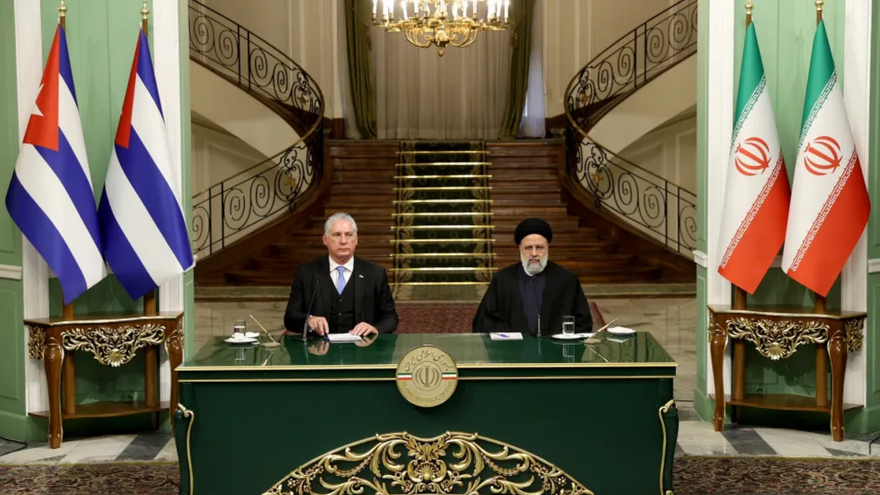
![]() EFE (via 14ymedio), Tehran, December 4, 2023 — Iran and Cuba agreed on Monday to strengthen their relations in all areas to face the sanctions of the United States, during an official visit of the Cuban president, Miguel Díaz-Canel, to Tehran.
EFE (via 14ymedio), Tehran, December 4, 2023 — Iran and Cuba agreed on Monday to strengthen their relations in all areas to face the sanctions of the United States, during an official visit of the Cuban president, Miguel Díaz-Canel, to Tehran.
Díaz-Canel was received by the president of Iran, Ebrahim Raisí, and both leaders met to work on a strategy of “an economy of resistance” to combat US imperialism and neutralize the sanctions suffered by the two “brother countries.”
The Americans believe that with the imposition of sanctions they can stop our countries or force us to surrender. This is not true
“The Americans believe that with the imposition of sanctions they can stop our countries or force us to surrender. This is not true,” Raisí said at a press conference with Díaz-Canel after the signing of seven agreements in various fields.
“To deal with these sanctions we are going to increase the exchange of our capacity and potential,” said Raisí, who described Díaz-Canel’s visit to Tehran as “a turning point” in relations between the two countries. The Iranian president stressed that the sanctions have not been successful and that Tehran and Havana have not renounced their principles. He asserted that their resistance is one of the main points in common between the two countries. “We two countries are against imperialism,” Raisí said.
Díaz-Canel, for his part, said that Tehran and Havana have conceived a strategy of “economy of resistance” in strategic areas such as energy, food, science, technology and health to face “the unjust sanctions with which imperialism attacks our peoples.”
“We have ratified the conviction that with this strategy we will deal a hard blow to imperialist aggression, sanctions and blockades,” said the Cuban president. Díaz-Canel arrived in Tehran last night, on the first visit of a Cuban president to Iran since 2001, accompanied by a large, high-level delegation. During his visit, the two countries have signed seven agreements and cooperation memorandums in the health, energy, agriculture, science, technology and communications sectors.
In addition, the Cuban president will visit the Pasteur Institute in Tehran, which collaborates with Cuba on medical projects, and will attend an exhibition of the “achievements of the latest technological capabilities of the Islamic Republic of Iran.”
The Cuban president will visit the Pasteur Institute in Tehran, which collaborates with Cuba on medical projects, and will attend an exhibition of the achievements of the latest technological capabilities of the Islamic Republic of Iran
The two leaders did not forget the conflict in the Gaza Strip and called for the creation of a coalition to support the Palestinian people in the face of the “ineffectiveness” of international organizations such as the UN and the Arab League, among others, to stop the war, in which at least 1,200 Israelis and more than 15,000 Palestinians have died.
“The honorable president of Cuba and I agree that a coalition must be created with the participation of allied countries to support the oppressed Palestinian people on different continents,” Raisí said.
Díaz-Canel, for his part, called for the urgent need of the international community to condemn the “genocide” committed against the Palestinian people, in addition to an immediate ceasefire and the creation of a Palestinian state.
Translated by Regina Anavy
____________
COLLABORATE WITH OUR WORK: The 14ymedio team is committed to practicing serious journalism that reflects Cuba’s reality in all its depth. Thank you for joining us on this long journey. We invite you to continue supporting us by becoming a member of 14ymedio now. Together we can continue transforming journalism in Cuba.
